 |
|
3rd International Symposium on Prefrontal Cortex
- Searching for Mechanism of Mind -
|
Date: |
November 29-30, 2012 |
Time: |
9:00 a.m. - 6:00 p.m. |
Place: |
Large Conference Room at Inamori Center,
Kyoto University
(New Building at the corner of Kawabata str. and Konoe str.)
|
Contact: |
Prof. Shintaro Funahashi, Kokoro Research Center, Kyoto University
|
Program |
Session 1: Information processes at molecular and cellular level
Session 2: Information processes at network level and generation of functions
Session 3: Basic and clinical studies using human subjects
|
|
Lecture by Prof. Adam Gazzaley
|
Date: |
Monday, July 30, 2012 |
Time: |
4:30 p.m. - 6:00 p.m. |
Place: |
Lecture Room 1102
Faculty of Integrated Human Studies,
Kyoto University
(Yoshida South Campus, Kyoto University)
|
Contact: |
Prof. Shintaro Funahashi
(kyoto University Kokoro Research center)
(E-mail: funahashi.shintaro.2z -at- kyoto-u.ac.jp |
program |
Neural networks underlying top-down modulation of visual processing
Dr. Adam Gazzaley, MD., Ph.D.
Associate Professor of Neurology, Physiology and Psychiatry,
Director of Neuroscience Imaging Center,
University of California at San Francisco,
USA
Top-down modulation is a bi-directional process that underlies our ability to focus our attention on task-relevant stimuli and ignore irrelevant distractions by differentially enhancing or suppressing neural activity in sensory cortical regions. It is believed that this modulation is not an intrinsic property of visual cortices, but is achieved via functional connectivity between sensory brain regions and a distributed network of frontal and parietal regions. I will present new data from our lab that reveals differential entrainment of stimulus-selective, visual association cortical areas with regions of the “frontal-parietal attention network” or the “default network” depending on the participant’s goals. Additionally, there is sparse evidence in humans that a direct causal connection exists between prefrontal control regions and visual cortical activity modulation. Using a multi-modal approach that couples fMRI, rTMS and EEG, I will present evidence for a direct role of the inferior frontal junction (IJF) in top-down modulation of feature processing and its influence on subsequent working memory.
|
|
"Neural Dynamics and Plasticity:
from Symapse to Network"
(Japan-France Joint Symposium)
|
Date: |
January 12 and 13, 2012 |
Time: |
9:30 a.m. - 5:00 p.m. |
Place: |
Large Conference Room
3rd Floor, Kyoto University Inamori center
(New building at the corner of Kawabata and Konoe)
|
Contact: |
Prof. Shintaro Funahashi
Kyoto University Kokoro Research Center
(E-mail: funahashi.shintaro.2z -at- kyoto-u.ac.jp |
プログラム |
***** Program *****
January 12, 2012
9:30-9:40
Opening remarks and introduction
Shintaro Funahashi (Kyoto University, Japan)
***** Part1: Prefrontal cortex *****
9:40-10:20
Prefrontal neural correlates of cognitive capacity limitation and its adaptive allocation revealed by a dual-task paradigm
Kei Watanabe (Kyoto University)
10:20-11:00
Prefrontal activity during trial-and-error knowledge updating
Tadashi Ogawa
(Kyoto University)
--- Break ---
11:15-11:55
Neural activity related to value-based decision making in rodent frontal cortex
Min Whan Jung (Ajou University, South Korea)
11:55-12:35
Multimodality decision making process in the cortex-basal ganglia loop
Thomas Boraud (University of Bordaux, France)
--- Lunch ---
***** Part 2: Symaptic mechanis
14:00-14:40
Intracortical mechanism of voluntary movements
Yoshikazu Isomura (Tamagawa University, Japan)
14:40-15:20
A balanced network model of primary motor cortex: the role of shunting inhibition in the generation of complex movements
Carl van Vreeswijk (University of Paris Descartes, France)
--- Break ---
15:40-
16:20
A bistable model of logarithmic STDP underlies working memory
Tomoki Fukai (RIKEN Brain Institute, Japan)
16:20-17:00
Balanced network model for working memory
Gianluigi Mongillo (University of Paris Descartes, France)
17:00-18:00
Discussion
++++++++ January 13, 2012 ++++++++++
***** Part 3: Neural networks *****
9:30-10:10
Correlated trial variability in cat visual cortex and possibility of their stimulus dependences
Hiroyuki Ito (Kyoto Kangyo University, Japan)
10:10-10:50
Reading neuronal spike trains
Shigeru Shinomoto (Kyoto University)
--- Break ---
11:10-11:50
The mechanism of orientation selectivity in primary visual cortex
David Hansel (University of Paris Descartes, France)
--- Lunch ---
13:30-14:10
Plasticity and neural dynamics in the corticostriatal network
Jeff Wickens (Okinawa Institute of Science and technology, Japan)
14:10-14:50
Dopamine modulates information flow through the basal ganglia and regulates behavioral variability
Arthur Leblois (University of Paris Descartes, France)
14:50-16:00
Discussion
|
|
Lecture by Prof. Akira Miyake
|
Date: |
Thursday, December 22, 2011 |
Time: |
4:30 p.m. - 6:00 p.m. |
Place: |
Seminar Room 101
Yoshida South Academic Building, Kyoto University
(Yoshida South Campus, Kyoto University)
|
Contact: |
Prof. Shintaro Funahashi
(kyoto University Kokoro Research center)
(E-mail: funahashi.shintaro.2z -at- kyoto-u.ac.jp |
program |
Individual differences in executive functions: four general conclusions.
Prof. Akira Miyake
Department of Psychology and Neuroscience, University of Colorado at Boulder, USA
|
|
"Metacognition and Consciousness:
from animal to human"
(Satellite Symposiun for ASSC)
|
Date: |
Wednesday, June 8th, 2011 |
Time: |
9:00 a.m. - 5:00 p.m. |
Place |
Large Conference Room
3rd Floor, Kyoto University Inamori Center
(New Building at the corner of Konoe and Kawabata)
|
Contact: |
Prof. Shintaro Funahashi (Kokoro Research center)
(E-mail: funahashi.shintaro.2z -at- kyoto-u.ac.jp) |
Program |
Summary:
Introspection into one's own mental state is a critical ability closely associated with consciousness. One important area of progress over the last decade has been the development of operational measures of metacognitive ability in animals and humans. The talks in this symposium will cover a broad range of recent progresses from metacognition in animals to neural mechanisms in humans. Further, we expect to open a lively, cross-disciplinar discussion on the relevance of metacognition to consciousness.
Organizers:
Shintaro Funahashi (Kyoto University, Japan)
Ryota Kanai (University College London)
9:00-9:20
Opening remarks and introduction
Shintaro Funahashi (Kyoto University, Japan)
9:20-10:00
Metacognitive approach to phenomenal and access consciousness
Ryota Kanai (University College Kondon, UK)
10:00-10:40
Metacognitive judgments reflect
conscious phenomenology
Hakwan Lau (Columbia University, USA)
--- Break ---
11:00-11:40
Metamemory in remembering intentions
Satoshi Umeda (Keio University, Japan)
11:40-12:20
Awareness of performance: what do we know about our choices
Steve Fleming (University College London, UK)
--- Lunch ---
14:00-14:40
Are birds metacognitive?
Kazuo Fujita (Kyoto University, Japan)
14:40-15:20
Metacognition and memory systems in primates: success and limitations.
Robert Hampton (Emory University, USA)
15:20-
16:00
Prefrontal neuronal activity in monkeys performing a metamemory task
Akio Tanaka (Kyoto University, Japan)
16:00-17:00
Discussion
|
|
Lecture by Prof. Alan C. Kamil
|
Date |
Wednesday, May 18, 2011 |
Time |
4:30 p.m. - 6:00 p.m. |
Place |
Seminar Room 101, Yoshida South Academic Building, Kyoto University
(Yoshida South Campus, Kyoto University)
|
Contact to |
Shintaro Funahashi, Kokoro Research center
(E-mail: funahashi.shintaro.2z -at- Kyoto-u.ac.jp |
Program |
Selective attention and its effects on prey
Prof. Alan C. Kamil
Department of Psychology, University of Nebraska-Lincoln, USA
We have combined sophisticated operant procedures, evolutionary concepts and genetic algorithms to study effects of the perceptual characteristics of predators on the evolution of their prey. We hypothesized that selective attention would bias predators towards the detection of prey similar to those recently encountered. This would favor survival of novel prey types, enhancing the evolution of variability in prey appearance.
In a series of experiments we demonstrated: (1) selective attention is an important component of visual search by predators (“search image”); (2) detection of less common prey was reduced while common prey were detected at high levels (“apostatic selection”); and, (3) selective attention by a predator does, in fact, lead to the evolution of increased variability in prey appearance (polymorphism). This research highlights one way the cognitive abilities of animals play an important role in biological systems.
|
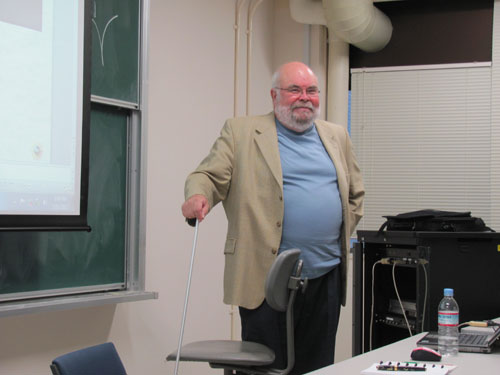
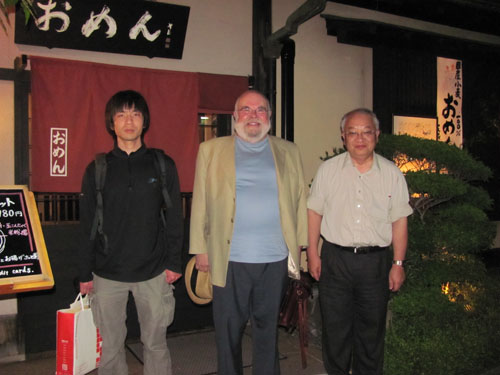
|
Lecture by Dr. Mark J. Buckley
|
Date: |
January 27, 2011 |
Time: |
4:30 - 6:00 p.m. |
Place: |
Lecture Room B23B at the Graduate School of Human and Environmental Studies, Kyoto University
(Yoshida South Campus of Kyoto Univeristy)
|
Contact: |
Prof. Shintaro Funahashi
(funahashi.shintaro.2z@kyoto-u.ac.jp)
|
Program |
Determining the crucial contributions made by distinct prefrontal and medial frontal cortical regions to rule-guided decision-making and cognitive control
Dr. Mark J. Buckley
Department of Experimental Psychology, University of Oxford, UK
The prefrontal cortex (PFC) and anterior cingulate cortex (ACC) are commonly implicated in decision-making. Decisions can operate at many levels. For example, we can decide which item to select, or we can decide which action to make. One part of the PFC, the orbitofrontal cortex (OFC), has been closely implicated in contributing to decisions between stimuli, whereas the ACC, part of the medial frontal cortex, has been more closely implicated in contributing to decisions between actions. Yet many forms of decision-making behaviour are more complex than merely choosing between stimuli or choosing between actions and the functional dichotomy outlined above may not be as simple as this. For instance, we are also able to make decisions about which behavioural rules we will adopt. Although there have been advances in our understanding of how rules are represented in the brain, less is known about the precise contributions of the PFC and ACC to rule-based decision-making. Recent lesion studies in macaque monkeys in our laboratories have provided new insights into the distinct and crucial contributions that different sub-regions of PFC and ACC make to rule-guided behaviour and cognitive control.
|
|
Lecture by Prof. Thomas Boraud
|
Date: |
December 20, 2010 |
Time: |
5:00 - 6:30 p.m. |
Place: |
Lecture Room B23A at the Graduate School of Human and Environmental Studies, Kyoto University
(Yoshida South Campus of Kyoto University)
|
Contact: |
Prof. Shintaro Funahashi
(funahashi.shintaro.2z@kyoto-u.ac.jp) |
Program |
The Cortex-Basal Ganglia Loop as a Dynamic System: Theoretical and Experimental Approach
Prof. Thomas Boraud
Directeur de Recherch CNRS,
UMR 5227 Laboratoire Mac,
University of Bordeaux 2, France
All animals have evolved rapid and efficient decision-making processes to solve complex and conflicting, sometime life-threatening, chioce situation. Nevertheless, these processes have reached an unprecedented degree of complexity in primates and, amongst them, humans. This has perhaps been at the price of an increased vulnerability to decision-making dysfunctions, as observed in several mental disorders. Because of this link between evolution and complexity of decision-making processes, it has commonly been assumed to be associated with the frontal cortical areas, often considered as the decision-making center of the brain. Here I propose to re-evaluate this concept with an alternative view in which decision-making processes emerge from a distributed process spread through cortical-subcortical loops. I will focus the demonstration on the cortex-basal-ganglia loop and will present behavioral, electrophysiological and fMRI studies in humans and non-human primates using multiple choice paradigms to support this theory.
|
|
Lecture by Prof. Avi Sadeh
|
Date: |
Monday, May 17, 2010 |
Time: |
4:30 p.m. - 6:00 p.m. |
Place: |
Meeting Room, 3rd Floor, Inamori Foundation Memorial Building
(A new building at the corner of Kawabata Street and Konoe Streeet)
|
Contact to: |
Shintaro Funahashi, Kokoro Research Center
|
Program |
“Sleep, Neurobehavioral Functioning and ADHD in Children”
Prof. Avi Sadeh
Department of Psychology, Tel Aviv University
and
Director, Adler Center for Research in Child Development and Psychopathology,
Tel Aviv University, Israel
Insufficient sleep and poor sleep quality often lead to behaviors and symptoms associated with Attention Deficit and Hyperactivity Disorder (ADHD) in normal children. These symptoms include compromised neurobehavioral functioning (NBF), inattentiveness and restless behaviors. In children diagnosed with ADHD, sleep complains are very common and objective findings suggest that, in comparison to controls, children with ADHD are more likely to suffer from primary sleep disorders and excessive daytime sleepiness. This overlap between sleep and ADHD suggests that sleep problems or insufficient sleep may play a role as an underlying or exacerbating factor in the etiology of ADHD. The presentation will cover studies demonstrating: (a) the links between sleep and NBF in normal children; (b) the impact of experimental sleep manipulation on NBF in normal children; (c) studies on sleep patterns and sleep disorders in children with ADHD; (d) and a study on the effects of medication for ADHD on sleep.
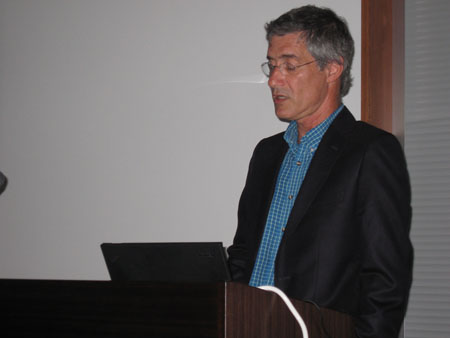
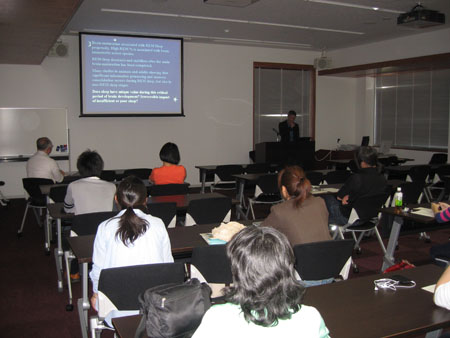
|
|
Lecture by Prof. William T. Newsome
Date: Wednesday, November 25, 2009
4:30 pm - 6:00 PM
Place: Inamori Memorial Building, 3rd Floor
Large Conference Hall
Kyoto University
(at the corner of Kabata Street and Konoe Street)
Contact to: Prof. Shintaro Funahashi (Kokoro Research Center)
(E-mail: sfunahashi-at-mbox.kudpc.kyoto-u.ac.jp)
+++++++ Program +++++++
"Linking action to reward:
multielectrode array recordings from prefrontal cortex"
Prof. William T. Newsome
Depatment of Neurobiology
Stanford University
and
Howard Hughes Medical Institute
**** Abstract ****
To investigate the neural basis of decision-making, we conducted multielectrode array recordings (96 electrodes) from the prearcuate gyrus while rhesus monkeys performed a motion discrimination task. We observed a wide range of visual, memory, and oculomotor signals as reported originally in the classic work of Funahashi and colleagues (J Neurophysiol, 1989), and we observed decision-related signals as reported originally by Kim and Shadlen (Nat Neurosci, 1999). A unique feature of our behavioral paradigm is that the reward was delivered after a variable 1-2 second delay after the monkey's operant response. Surprisingly, the most prominent neural signals we observed in the prearcuate gyrus occurred during this reward-delay period, and appeared to represent a memory of the action executed by the monkey before receiving the reward. These action-memory signals may play an important role in learning by linking a current action to rewards that occur seconds (or perhaps longer) into the future. Standard forms of spike-timing dependent plasticity cannot mediate learning under these circumstances because they only operate over tens of milliseconds at best. Action-memory signals in prefrontal cortex may provide the necessary link between current actions and future rewards, consistent with reinforcement learning theory.
|
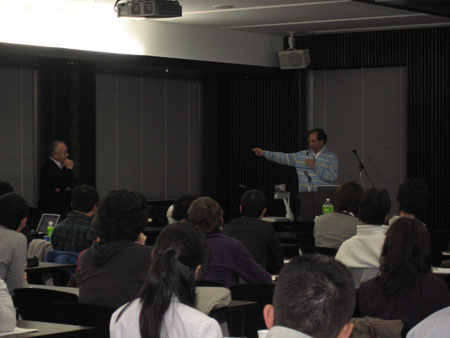
|
Workshop with Prof. William T. Newsome
Date: Wednesday, November 25, 2009
1:00 pm - 4:00 PM
Place: Inamori Memorial Building, 3rd Floor
Large Conference Hall
Kyoto University
(at the corner of Kabata Street and Konoe Street)
Contact to: Prof. Shintaro Funahashi (Kokoro Research Center)
(E-mail: sfunahashi-at-mbox.kudpc.kyoto-u.ac.jp)
+++++++ Program +++++++
Session 1: Disparity
1:00 - 1:15
Hiroshi Shiozaki (Osaka Univ., Frontier Bioscience)
"Neural correlates of fine disparity discrimination in macaque area V4."
1:15 - 1:30
Takahiro Doi (Osaka Univ., Frontier Bioscience)
"Temporal characteristics of disparity computations in stereopsis."
1:30 - 1:45
Shingo Tanaka (Osaka Univ., Frontier Bioscience)
"Stimulus size tuning in macaque area V4 is dependent on binocular disparity and related to size constancy."
Session 2: Visual perception
2:00 - 2:15
Fumie Sugimoto (Kwansei Univ. Integrated Psychological Science)
"Attentional modulation in perception of speed occures in the first motion-processing stage."
2:15 - 2:30
Mikio Inagaki (Osaka Univ., Frontier Bioscience)
"Effects of stimulus size on spatial frequency tuning of face-responsive neurons in the temporal visual cortex and the amygdale."
2:30 - 2:45
Naoki Yamamoto (Kwansei Univ., Integrated Psuchological Science)
"Anisotropy of object shape perception with peripheral vision."
2:45 - 3:00
Koji Ikezoe (Osaka Univ., Frontier Bioscience)
"Spatial arrangement of orientation selective neurons in monkey V1 revealed by using in vivo 2-photon calcium imaging."
Session 3: Prefrontal cortex
3:15 - 3:30
Mika Takebayashi (Kyoto Univ., Human and Environmental Studies)
"Do monkeys exhibit preference for biologically non-significant visual stimuli?"
3:30 - 3:45
Akio Tanaka (Kyoto Univ., Human and Environmental Studies)
"Neuronal activity in the primate dorsolateral prefrontal cortex during a metamemory task."
3:45 - 4:00
Mikhail Votinov (Kyoto Univ., Medicine)
"Virtual endowment effect."
|
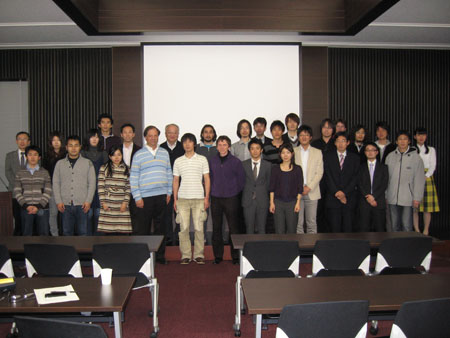
|
Lecture by Prof. Daeyeol Lee
Date: Friday, July 31, 2009
4:30 pm - 6:00 PM
Place: Graduate School of Human and Environmental Studies
LectureRoom B23
Kyoto University
(Yoshida South Campus)
Contact to: Prof. Shintaro Funahashi (Kokoro Research Center)
(E-mail: sfunahashi-at-mbox.kudpc.kyoto-u.ac.jp)
+++++++ Program +++++++
"Single neurons and decision making in the primate brain"
Prof. Daeyeol Lee
Depatment of Neurobiology
Yale University School of Medicine
New Haven, CT, USA.
**** Abstract ****
We investigated the nature of information coding in the prefrontal cortex and basal ganglia of monkeys during inter-temporal choice and computer simulated competitive games. During inter-temporal choice task, monkeys discounted the value of reward according to a hyperbolic function of its delay, and the information about the reward magnitude and delay is transformed in to temporally discounted values in the prefrontal cortex and basal ganglia. During a biased matching pennies and rock-paper -scissors, many neurons in the prefrontal cortex and basal ganglia also encoded the signals related to gains and losses resu lting from the animal's choices. These results suggest that the primate corticostriatal network plays a key role in evaluat ing decision outcomes and updating the animal's decision-making strategies.
|
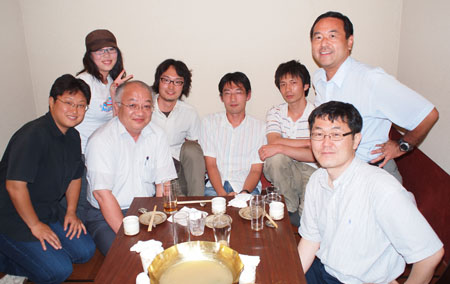
|
Lecture by Prof. Synnove Carlson
Date: Thursday, May 28, 2009
10:30 am - 12:00
Place: Kyoto University Yoshida South Campus
Graduate School of Human and Environmental Studies
SeminarRoom 101.
Contact to: Prof. Shintaro Funahashi (Kokoro Research Center)
(E-mail: sfunahashi-at-mbox.kudpc.kyoto-u.ac.jp)
+++++++ Program +++++++
"Working memory and the prefrontal cortex"
Prof. Synnove Carlson
Helsinki University of Technology &
Helsinki University School of Medicine
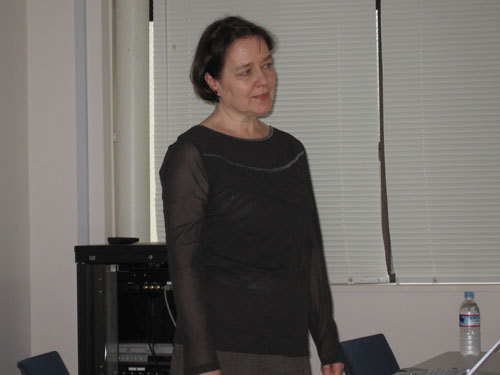
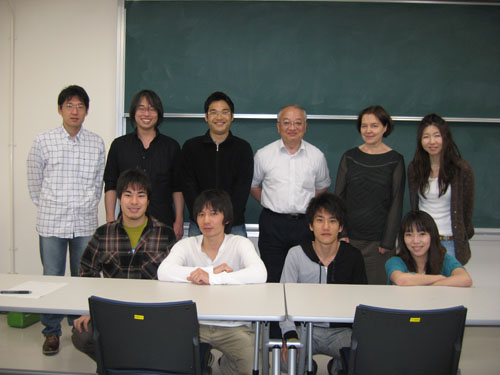
|
|
Lecture by Prof. David Hansel
Date: Thursday, April 23, 2009
4:00 pm - 5:30 pm
Place: Kyoto University Yoshida South Campus
Graduate School of Human and Environmental Studies
Lecture
Room B23.
Contact to: Prof. Shintaro Funahashi (Kokoro Research Center)
(E-mail: sfunahashi-at-mbox.kudpc.kyoto-u.ac.jp)
+++++++ Program +++++++
"Balanced Spatial Working Memory"
Prof. David Hansel
Neurophysique et Physiologie
Departement Biologie, Medecine et Sante
Universite Paris Descartes
(University of Paris 5 &8211; Rene Descartes)
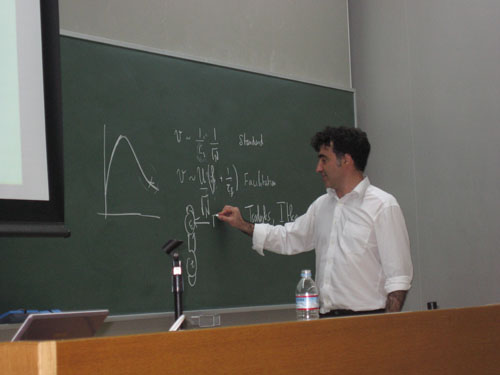
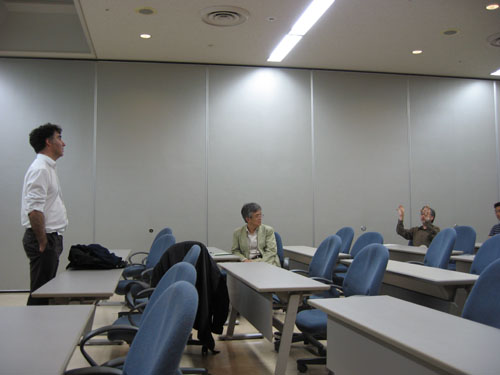
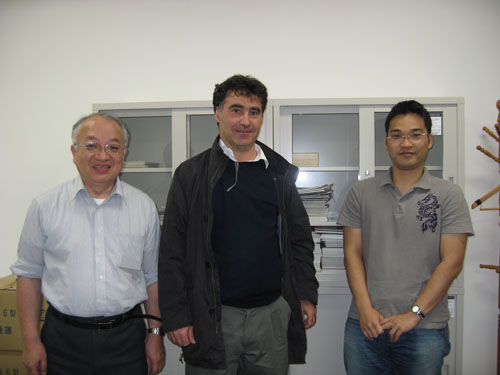
|
|
27th Kokoro Seminar
Date: Thursday, September 4, 2008
4:30 pm - 6:00 pm
Place: Kyoto University Yoshida South Campus
Graduate School of Human and Environmental Studies
LectureRoom B32.
Contact to: Prof. Shintaro Funahashi (Kokoro Research Center)
(E-mail: sfunahashi-at-mbox.kudpc.kyoto-u.ac.jp)
+++++++ Program +++++++
"Biological and evolutional scenario in origin of language"
Dr. Kazuo Okanoya
(Team Leader, RIKEN Brain Science Institute)
|
|
3rd Meeting for Addiction Research
Date: Tuesday, August 5, 2008
4:30 pm - 7:00 pm
Place: Kyoto University Shiran-Kaikan Anex
Seminar Room 1 (2nd Floor)
Contact to: Prof. Shintaro Funahashi (Kokoro Research Center)
(E-mail: sfunahashi-at-mbox.kudpc.kyoto-u.ac.jp)
+++++++ Program +++++++
"Endowment Effect and neural representation of price evaluation"
Mikhail Votinov
(Kyoto University Graduate School of Medicine)
"Cognition and behavior related tosuccesive uncertain phenomenon"
Kouji Murakami
(Kobe Yamate University)
|
|
Special Lecture
Date: Monday, July 28, 2008
3:00 pm - 4:30 pm
Place: Kyoto University Yoshida South Campus
Yoshida South Academic Building
South East Wing, Room 101.
Contact to: Prof. Shintaro Funahashi (Kokoro Research Center)
(E-mail: sfunahashi-at-mbox.kudpc.kyoto-u.ac.jp)
+++++++ Program +++++++
Observation of other's behavior and roles of the ventral premotorcortex and the temporo-parietal junction
Dr. Satomi Higuchi
(Research Associate
Faculty of Psychology
Lankaster University, UK)
|
|
Public Lecture
"Learning Disorder (LD) and its Support"
Date: Sunday, June 8, 2008
1:00 pm - 4:00 pm
Place: Kyoto University Graduate School of Human and Envirinmental Studies
Lecture Room B23 (Basement)
Contact to: Prof. Shintaro Funahashi (Kokoro Research Center)
(E-mail: sfunahashi-at-mbox.kudpc.kyoto-u.ac.jp)
+++++++ Program +++++++
1:00 - 1:50
Akira Kawamura, Ph.D.
"Educational support to LD children based on working memory functions"
2:00-2:50
Yasuko Funabiki, M.D., Ph.D.
"Problems for supporting children with LD"
3:00 - 4:00
"General discussion"
Akira Kawamura
Yasuko Funabiki
Akiko Komatsu
Keiko Chyaki
Yoshihiro Kadono
Shintaro Funahashi: coordinator
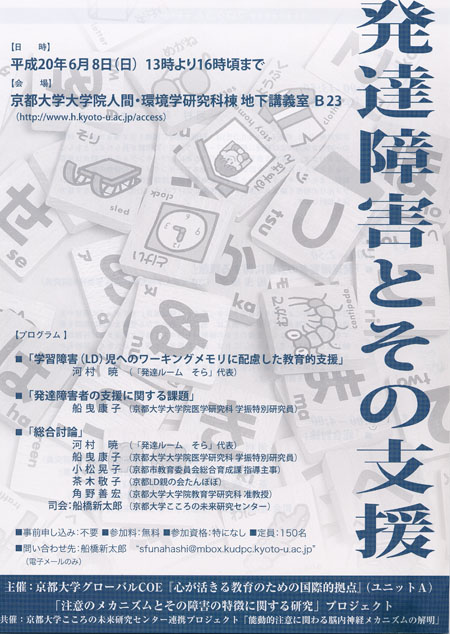
|
| 20th "Kokoro" Seminar |
Date: |
Thursday, October 18, 2007 |
Time: |
4:00p.m. - 5:30p.m. |
Place: |
Kyoto University
Shiran-Kaikan Annex
Meeting Room 2 (Second Floor)
|
Contact: |
S. Funahashi
Kyoto University Kokoro Research Center
Contact |
Lecturor and
The Title of the Talk |
Prof. Etsuro Mori
(Tohoku
University Graduate School of Medicine
)
"Brain and intention " |
|
| 16th "Kokoro" Seminar |
Date: |
Tuesday, Sep 11, 2007 |
Time: |
4:00p.m. - 5:30p.m. |
Place: |
Kyoto University
Faculty of Integrated Human Studies
Lecture Room 1102 (First Floor)
http://www.h.kyoto-u.ac.jp/access |
Contact: |
S. Funahashi
Kyoto University Kokoro Research Center
Contact |
Lecturor and
The Title of the Talk |
Asso. Prof. Kazuo Hiraki
(University of Tokyo, Graduate School of Arts and Sciences
)
"Cognition of self and non-self and communication " |
|
| 15th "Kokoro" Seminar |
Date: |
Thursday, Aug 2, 2007 |
Time: |
5:00p.m. - 6:30p.m. |
Place: |
Kyoto University
Faculty of Integrated Human Studies
Lecture Room 1102 (First Floor)
http://www.h.kyoto-u.ac.jp/access |
Contact: |
S. Funahashi
Kyoto University Kokoro Research Center
Contact |
Lecturor and
The Title of the Talk |
Prof. Kae Nakamura
(Kansai Medical University Department of Physiology)
"Neural mechanisms of behavioral changes based on reward information in the basal ganglia " |
|
| 10th "Kokoro" Seminar |
Date: |
Wednesday, May 23, 2007 |
Time: |
1:00p.m. - 2:30p.m. |
Place: |
Kyoto University
Graduate School of Human and Environmental Studies
Lecture Room B23-A
http://www.h.kyoto-u.ac.jp/jinkan/top/map.html |
Contact: |
S. Funahashi
Kyoto University Kokoro Research Center
Contact |
Lecturor and
The Title of the Talk |
Prof. Takashi Omori
(Tamagawa University Faculty of Engineering) |
|
| 9th "Kokoro" Seminar |
Date: |
Tuesday, May 15, 2007 |
Time: |
3:00p.m. - 4:30p.m. |
Place: |
Kyoto University
Graduate School of Human and Environmental Studies
Lecture Room B23-A
http://www.h.kyoto-u.ac.jp/jinkan/top/map.html |
Contact: |
S. Funahashi
Kyoto University Kokoro Research Center
Contact |
Lecturor and
The Title of the Talk |
Dr. Shinya Yamamoto
(National Institute of Advanced Industrial Science and Technology) |
|
| 1st"Kokoro" Scientific Meeting on Dependency |
Date: |
Monday, April 10, 2007 |
Time: |
2:00p.m. - 4:30p.m. |
Place: |
Kyoto University
Shiran Kaikan Annex
2nd Floor Lecture Room |
Contact: |
S. Funahashi
Kyoto University Kokoro Research Center
Contact |
Lecturor and
The Title of the Talk |
Dr. Hiroki Fukui
(National Institute of Psychiatric and Neurological Diseases)
"Dependency as an impairment of reward system: its neural bases"
Prof. Ichiro Tanioka
(Osaka University of Marchandise)
"Gamble-dependency and its social effects"
|
|
| 7th "Kokoro" Seminar |
Date: |
Monday, February 19, 2007 |
Time: |
3:00p.m. - 4:30p.m. |
Place: |
Kyoto University
Graduate School of Human and Environmental Studies
Lecture Room B23-A
http://www.h.kyoto-u.ac.jp/jinkan/top/map.html |
Contact: |
S. Funahashi
Kyoto University
Graduate School of Human and Environmental Studies
Contact |
Lecturor and
The Title of the Talk |
Dr. Michiyo Iba
(Tamagawa University Brain Research Institute)
"Locue coeruleus-norepinephrine system and its relation to cognitive functions" |
|
| 6th "Kokoro" Seminar |
Date: |
Tuesday, January 23, 2007 |
Time: |
10:30a.m. - noon |
Place: |
Kyoto University
Graduate School of Human and Environmental Studies
Lecture Room B23-A
http://www.h.kyoto-u.ac.jp/jinkan/top/map.html |
Contact: |
S. Funahashi
Kyoto University
Graduate School of Human and Environmental Studies
Contact |
Lecturor and
The Title of the Talk |
Dr. Takashi Okada
()
|
|
| 5th "Kokoro" Seminar |
| Date: |
Wednesday, December 6, 2006 |
| Time: |
3:00p.m. - 4:30p.m. |
| Place: |
Kyoto University
Graduate School of Human and Environmental Studies
Lecture Room B23-B
http://www.h.kyoto-u.ac.jp/jinkan/top/map.html |
Contact: |
S. Funahashi
Kyoto University
Graduate School of Human and Environmental Studies
Contact |
Lecturor and
The Title of the Talk
|
Prof. Tadaharu Tsumoto
(Brain Research Institute, RIKEN)
"Plasticity of the Developing Brain and Its Mechanisms" |
|
| 4th "Kokoro" Seminar |
| Date: |
Wednesday, November 29, 2006. |
| Time: |
3:00p.m. - 4:30p.m. |
| Place: |
Kyoto University
Graduate School of Human and Environmental Studies
Lecture Room B23-B
http://www.h.kyoto-u.ac.jp/jinkan/top/map.html |
Contact: |
S. Funahashi
Kyoto University
Graduate School of Human and Environemtal Studies
Contact |
Lecturor and
Title of the Talk:
|
Dr. Katsuyuki Sakai
(University of Tokyo School of Medicine)
"Representation and Processing of Information in the Prefrontal Cortex" |
|
| 3rd "Kokoro" Seminar |
| Date: |
Friday, October 6, 2006. |
| Time: |
5:00p.m. - 6:30p.m. |
| Place: |
Kyoto University
Faculty of Integrated Human Studies
Lecture Room 1102
http://www.h.kyoto-u.ac.jp/soujin/welcome/map.html |
Contact: |
S. Funahashi
Kyoto University
Graduate School of Human and Environmental Studies
Contact |
Lecturor and
Title of the Talk:
|
Prof. Kyoko Matsumura
(Hyogo University of Education)
"Education for Developing Emotional Intelligence"
|
|
| 2nd "Kokoro" Seminar |
| Date: |
Friday, September 15, 2006. |
| Time: |
4:00p.m. - 5:30p.m. |
| Place: |
Kyoto University
Faculty of Integrated Human Studies
Lecture Room 1103
http://www.h.kyoto-u.ac.jp/soujin/welcome/map.html |
Contact: |
S. Funahashi
Kyoto University
Graduate School of Human and Environmental Studies
Contact |
Lecturor and
Title of the Talk
|
Dr. Yasushi Kobayashi
(Osaka University Graduate School of Frontier Biosciences)
"Neural Mechanisms to generate reward-prediction-error in the parapontine tegmental nucleus(PPTN)" |
|
| 1st "Kokoro" Seminar第1回 こころの未来セミナー |
| Date: |
Monday, August 14, 2006. |
| Time: |
10:00a.m. - 1:00p.m. |
| Place: |
Kyoto university
Faculty of Integrated Human Studies
Lecture Room 1103 |
Contact: |
S. Funahashi
Kyoto University
Graduate School of Human and Environmental Studies
Contact |
| 1st Lecturor and
Title of the Talk
|
Dr. Kenji Matsumoto
(Brain Science Institute, RIKEN)
"Neural Mechanisms for Monitoring of the Behavioral Results and
Renewal of the Behavioral Values in the Medial Prefrontal Cortex"
|
| |
| 2nd Lecturor and
Title of the Talk
|
Dr. Madoka Matsumoto
(Brain Science Institute, RIKEN)
"Internal and External Drive of Top-Down Attention Mechanisms in the Prefrontal Cortex" |
| |
|
|
©forbid reproduction such as contents
/ a photograph / design carried in this site without permission.
|
|
|
 |





